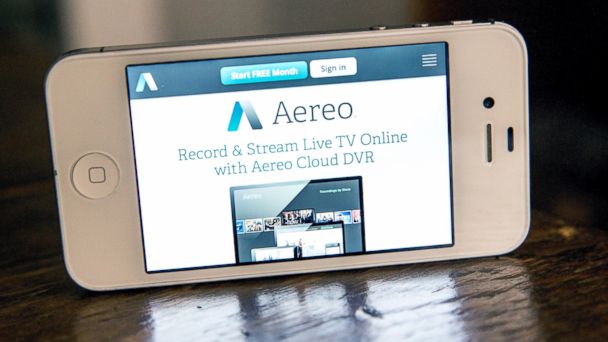Supreme Court's Aereo Decision Victory for Broadcasters
In a victory for broadcasters, the Supreme Court today ruled against Aereo, a start-up company that transmits to its subscribers broadcast television programs over the internet for a monthly subscription fee.
Aereo, backed by media mogul Barry Diller, does not have any license from copyright holders to record or transmit their programs.
In a 6-3 decision Justice Stephen Breyer said Aereo violated the Copyright Act of 1976 which gives a copyright owner the "exclusive right" to perform the copyrighted work publicly.
Aereo Case at the Supreme Court: What's at Stake?
TV's Future Might Ride on Supreme Court Aereo Ruling
"We must decide whether respondent Aereo infringes this exclusive right by selling its subscribers a technologically complex service that allows them to watch television programs over the internet at about the same time as the programs are broadcast over the air. We conclude that it does," Breyer wrote.

Aereo.com, a web service that provides television shows online, is shown on an iPhone 4S, April 22, 2014, in New York City. Andrew Burton/Getty Images
He was joined by Chief Justice John Roberts, Anthony Kennedy, Ruth Bader Ginsburg , Sonia Sotomayor and Elena Kagan.
The suit was brought by broadcasters, including ABC. The Walt Disney Co., the parent company of ABC, said in a statement: "We're gratified the court upheld important copyright principles that help ensure that the high-quality creative content consumers expect and demand is protected and incentivized."
Breyer went out of his way to say the case applies to Aereo and not to the larger issue of the Cloud.
"We have not considered whether the public performance right is infringed when the user of a service pays primarily for something other than the transmission of copyrighted works, such as the remote storage of content," Breyer wrote.
The case turned around the definition of a "public performance." Paul Clement, a lawyer for the broadcasters argued that Aereo publicly performed copyrighted work in violation of the Copyright Act. "This would seem to be obvious copyright infringement," he argued, "an entire business model premised on massive and unauthorized commercial exploitation of copyrighted works, where the prices of competitors are undercut because they are licensed and pay fees."
Aereo said it was not infringing upon the law because it is not engaged in any performance to the public. A subscriber accesses Aereo's equipment by logging into an account and selects a program which activates a remote antenna assigned only to the subscriber. Aereo's off site location has thousands of dime-sized antenna.
"Because the performance embodied in each transmission from Aereo's equipment - the user's playing of her recording - is available only to the individual user who created that recording, the performance is private not public," Aereo's lawyers argued.
Aereo had won in the lower court, but a dissenting judge called the business model a "Rube Goldberg like contrivance, over-engineered in an attempt to avoid the reach of the Copyright Act."